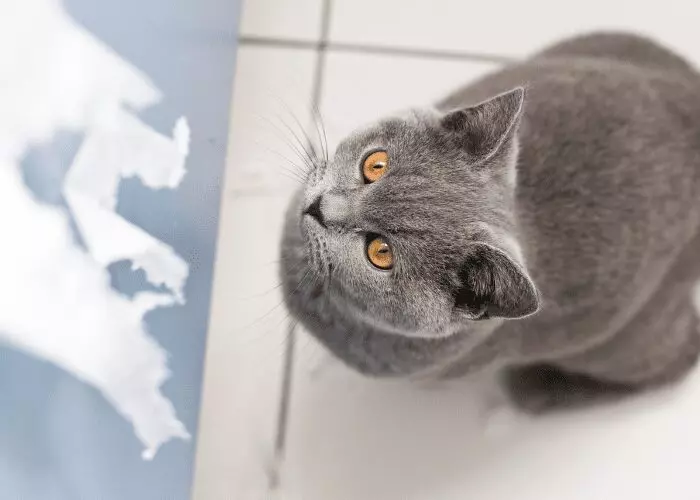You might often wonder if cats hold grudges. And if you’ve ever wondered if cats do things out of spite, then you’re certainly not alone. Do you ever feel as if your cat is mean muggin’ you from atop the refrigerator every time you’re having a light night snack? And what about those freshly laundered linens that spent hours tumbling in the dryer; lay soiled as a 300-thread count makeshift litter box on your floor?
How many times will Mittens majestically leap onto the kitchen countertop only to stare you in the face whilst nonchalantly knocking a beverage onto the floor? Why does this said beverage always have to be the least stain friendly of all time? Do you sometimes feel as if your cat seeks pleasure from irritating you and making messes? What have you done to provoke such spiteful behavior? Do cats know what spite is? These are questions the majority of cat owners will mutter to themselves, at some point in their cat’s life. Let’s take a closer look into the feline mind to determine if this could be true.
Cats have strong emotions, and their memory is sharp
Reasons that support cats’ lack of malicious intent, outweigh the reasons why we think they are being spiteful. Humans naturally like to think of our beloved four-legged companions as having human-like emotions. When most people tell a story to others involving their cat; it is common to personify the cat’s behavior and actions. Personally, I think some of this may be attributed to how felines have been presented throughout the history of film and television.
Think back to your childhood specifically, to those cats from popular animated films, comic strips, television, and books. The Cheshire cat from Alice and Wonderland, Mr.Jinxy from Meet the Parents, and of course Garfield are some famous cats renowned for their spiteful behavior! But, this is exactly what we love about them! That is until your cat acts this way to you.
Did you know that a cat’s memory can last up to 16 hours, while a dog’s is only five minutes on average?
Felines are capable of complex emotions and feelings. Cats can also learn from their owner’s behaviors and associate positive or negative feelings towards them. A study in 2015 was done that tested the social cognition of cats. It was the first study done using cats in quite some time, as most of these studies are performed with canines. This is primarily due to the fact that cats tend to be a little more problematic in laboratory settings than dogs, making them rare subjects for social interaction testing.
Surprisingly, it was found that cats display characteristics equal to canines in their social interaction with humans. Cats, like dogs, can read the facial expression of their owner, and tell their voice apart from a stranger’s voice. Cats will even look where you point or gaze at what you are gazing at. Felines also value attention and time spent with their owners, and in some cases, they actually prefer human affection over food and toys. (For more info on this study, click here.)
Those aren’t really spiteful actions, those are pleas for attention
Despite how premeditated your cat may appear; most experts agree that these behavioral problems are not spite derivative. More often than not, it’s your cat’s way of expressing that it needs something from you to make it feel more comfortable. Stress is what fuels these begrudging outbursts. A new significant other, new pet, moving, or even the smell of another animal on their caretaker can induce stress in cats. Moreover, your pet’s concept of time is somewhat limited and differs greatly in comparison to humans. To engage in a spiteful act, one must consciously want to hurt, offend, or annoy, someone or thing. The concept of harboring anger or dislike towards a person is not relevant to felines. This is largely due in part that felines live and operate in the present.
This is not to say that cats cannot remember and learn which they do quite well. It’s more than instinct takes over when cats are anxiety-ridden or feeling insecure and they act out. Cats may also display these behaviors if they are bored, ill, or their litter box is not up to their high standards. By more closely observing your cat’s behavior, one should be able to pinpoint the problem.
This may take some trial and error, so don’t get frustrated. Often felines act out in ways unassociated with the problem at hand. Occasionally, multiple issues may need your attention. By securing your cat’s needs and observing their behavior closely we can end this rather one-sided grudge match once and for all. So, the next time your kitty sends that cup of water flying or hangs from your new curtains know that they’re not doing it to drive you mad, they mainly are just curious or simply want your undivided attention.






